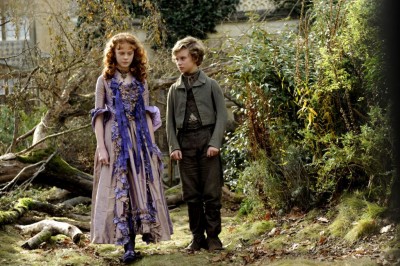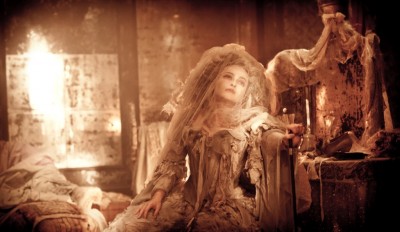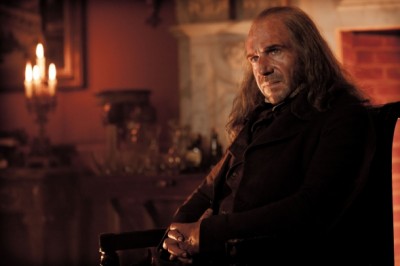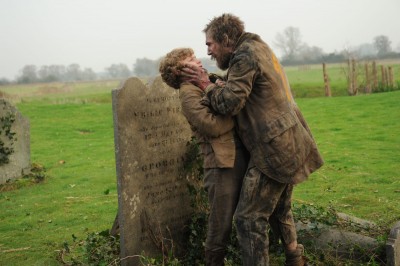
Though it will destroy my always shaky credibility with the hipster crowd, I freely admit to loving the works of Charles Dickens, and I rate his Great Expectations at least near the top of his novels, if not at the very peak. This latest cinematic attempt at the book—made last year to cash in on … excuse me, I mean, to honor Dickens’ 200th birthday—is certainly a worthy addition to the world of Dickens on film. It does lack the symbolism (Magwitch as Christ figure) of Stuart Walker’s 1934 film, and the somewhat overblown gothic trappings of David Lean’s 1946 version, but it’s a solid take on the story with some truly inspired casting and atmospheric direction from Mike Newell. While Newell is an uneven director, at his best—think the criminally underseen An Awfully Big Adventure (1995)—he’s no mean stylist, and that’s the case here.

As with all film versions of Dickens, something is lost in the translation. The greatest joy in Dickens lies in his descriptive passages—those things you read again in adulthood and realize how little of the wit or complexity you understood when you first encountered them in high school. The best a film can do is capture the atmosphere, dialogue and story. Since Great Expectations boasts perhaps the best of Dickens’ stories and offers plenty of atmosphere, it’s one of the most adaptable of his books. And this version illustrates that admirably.

Great Expectations, like David Copperfield, is also a story where the lead character requires two actors—one to play young Pip (newcomer Toby Irvine) and one to play adult Pip (Jeremy Irvine, War Horse). That means that it falls to some degree to the supporting cast to hold the two time frames together. This where this latest Great Expectations soars. Helena Bonham Carter’s Miss Havisham is quite the most fascinating incarnation of this character I’ve ever seen, and she’s matched every step of the way by Ralph Fiennes as Abel Magwitch. It is they—and, to a lesser extent, Robbie Coltrane as Jaggers, Jason Flemying as Joe and Ewen Bremner as Wemmick—who hold the film together far more than the leads. To some degree, that’s as it should be, since Dickens’ supporting characters are often the heart of his works. We remember Mr. Micawber, Uriah Heep, Fagin, etc. far more than the title characters of the books that contain them.

The film nicely encapulates the book’s incredibly complex and finely interwoven narrative, with all its surprising revelations. I’m guessing at this late date that the surprises are few, but they feel fresh and reasonably accomplished. Then again, the surprises may be fresher than I think, since I don’t know if Great Expectations is still required reading in schools, and I suspect that only the Masterpiece Theatre crowd read Dickens for pleasure these days. On the assumption that there is someone out there who doesn’t know the story, I’ll merely say that it’s the tale of an orphaned boy, Pip, living in the marshes with his shrewish sister (Sally Hawkins) and her kindly, much-put-upon blacksmith husband, Joe. The story opens when an escaped convict, Magwitch, frightens the boy into securing food and a file—an event that almost gets him in trouble with his aunt, but which the recaptured Magwich prevents by claiming to have stolen the items. Not long after, Pip is invited by the reclusive—and very strange—Miss Havisham to serve as a “playmate” for her young ward, Estella (Rose Barlow). However, he’s dismissed when Estella appears to be growing fond of him. So he settles in as apprentice to Joe—something that ends when he comes into an anonymous legacy a few years later, the “great expectations” of the title. That’s where the complexity of the story really begins to show.

This isn’t a radicalized Great Expectations, but it’s a very good—mostly traditionalist (with a few intriguing exceptions)—version of the story. It holds its own, though in a different key, with the two earlier theatrical film versions. It’s lovingly crafted and sumptuously produced. And Bonham Carter and Fiennes push it even higher. Since we really don’t get all that many classic novel-to-film transitions these days, it’s even something of an event in its quiet way. Plus, if you happen to be a high school freshman in a bind, you could probably wrangle a book report out of it—taking some care about the final scene. Rated PG-13 for some violence, including disturbing images.
Playing at Carolina Cinemas




Before you comment
The comments section is here to provide a platform for civil dialogue on the issues we face together as a local community. Xpress is committed to offering this platform for all voices, but when the tone of the discussion gets nasty or strays off topic, we believe many people choose not to participate. Xpress editors are determined to moderate comments to ensure a constructive interchange is maintained. All comments judged not to be in keeping with the spirit of civil discourse will be removed and repeat violators will be banned. See here for our terms of service. Thank you for being part of this effort to promote respectful discussion.